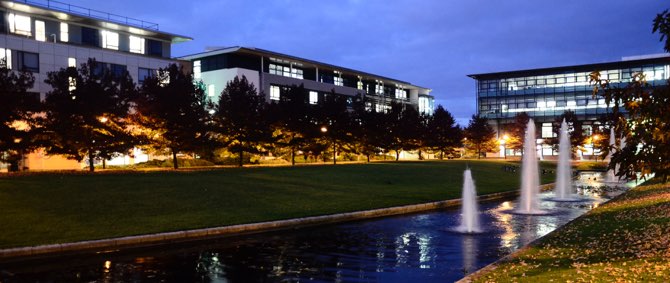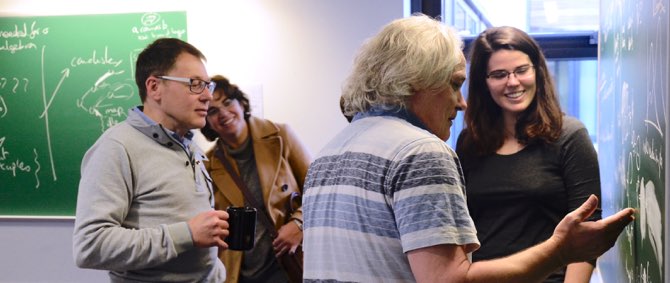Research degrees (PhD)

Personalised PhD training
PhD students involved with the Statistics department can be on a "customised" PhD programme (described on these pages) or in one of our CDTs (Centres for Doctoral Training, see below). Although studying within a CDT is ideal if the topics spanned by the programme fully match your interests, students who already have a clear idea of their future direction and/or wish to start directly with their PhD project are better served by our customised PhD Programmes. These enable you to:
- Start from day one working with your supervisor on a planned programme of research which fully matches your central interests. This is especially useful if you choose to study in a technical area of research where several months of preparation are often needed before you are equipped to pursue new exciting frontiers in your chosen domain.
- Benefit from a wide range of training in your first year bespoke to your future trajectory. Training courses are chosen in consultation with your supervisor to equip you with research skills both for your project and more broadly for your future career.

Research in probability and statistics at Warwick
Warwick Statistics Department is one of the largest and most energetic research environments in the UK. It boasts many internationally recognised researchers eager to engage new bright students and collaborators so that they can contribute to their programmes of investigation. Research within the department can be conveniently divided into three areas which are rather distinct but present a lot of synergies:
- Probability and Stochastic Finance;
- Statistical Methodology and Computational Statistics;
- Data Intensive Research and Scientific Statistical Modelling.
We offer financial support to the best appropriate students for each of these streams. In particular we have funding to support a Home/EU student specifically targeted at these customised research programmes.
To find out more: Keep an eye out for news of the 2018/2019 Postgraduate Open Day (email stats.pg.support@warwick.ac.uk for up-to-date information)
Fees & Funding Opportunities (Early Deadlines!)
General enquiries
Postgraduate Support Officer: stats dot pg dot support at warwick dot ac dot uk
PhD Admissions Tutors
Prof Martyn Plummer Martyn dot Plummer at warwick dot ac dot uk
Prof Barbel Finkenstadt-Rand B dot F dot Finkenstadt at warwick dot ac dot uk
Research seminars and development
There are regular seminars and reading groups to engage in Workshops discussing cutting edge research topics take place throughout the year. In their first year students attend APTS (Academy for PhD Training in Statistics), or similar training programmes aimed at their research development. Seminars are open to everybody, and PhD students are particularly encouraged to take part.
The YRM (Young Researchers Meeting) takes place weekly during term time and gives students the opportunity to practice their presentations, talking about their work in a friendly environment.
Special departmental initiatives promote research and interaction in broad major areas and provide the Department's PhD students with a wide variety of academic resources, including sustained programmes of research seminars and international workshops.
Here are some of the initiatives at Warwick Statistics:
-
The Centre for Research in Statistical Methodology (CRiSM)
-
The Probability at Warwick initiative (P@W)
-
The Stochastic Finance at Warwick initiative (SF@W)
Why Warwick?
The University of Warwick has one of the largest Statistics departments in the world, with a thriving PhD program and a long-established reputation for research activity of the highest quality, enhancing both the PhD-student experience and the demand for our PhD graduates.
Warwick Statistics and Warwick Mathematics Institute together rank third nationally among mathematical sciences research groups, in the most recent UK government research assessment REF 2014. In particular, the research environment at Warwick is rated as the very best in the UK for mathematical sciences (achieving the maximum score of 100% at 4*).
You can find out more about our research in the Warwick Statistics Research Spotlights brochure (pdf file, about 40MB) featuring a sample of recent applied research projects, in the Departmental research pages and on Individual academics by research areas.
Centres for Doctoral Training
Students within a Centre for Doctoral Training generally have a taught first year, and then will focus on more specialised research. Hence, the typical length of such a PhD programme is four years.
We are currently involved in the following broad range of CDTs.
- The Warwick CDT in Mathematics and Statistics is a joint initiative between the Department of Statistics and the Mathematics Institute. It covers research across the broad range of mathematical sciences.
- PhD opportunities within the Alan Turing Institute (a.k.a. "The Turing"): The Alan Turing Institute is a joint venture between the universities of Cambridge, Edinburgh, Oxford, University College London, Warwick, and the Engineering and Physical Sciences Research Council (EPSRC). Our doctoral studentship scheme leverages the strengths and expertise of these partners while harnessing the Turing’s unique convening power as the UK’s national institute for data science, to foster and develop exciting interdisciplinary engagement with the wider data science community and the world at large.
-
Mathematics for Real-World Systems (MathsSys) is a doctoral training centre coordinated by three interdisciplinary research centres. The PhD students will be supervised by academics from a range of departments including Statistics, Mathematics, Physics, Systems Biology and Computer Science. Information about further funding opportunities can be found at: http://www2.warwick.ac.uk/fac/sci/mathsys/apply/funding/.
-
The Molecular Analytical Science (MAS) will train a new generation of scientists in exploiting synergies between different experimental methods and in combining data collection with experimental design, statistical analysis, modelling and simulation.
